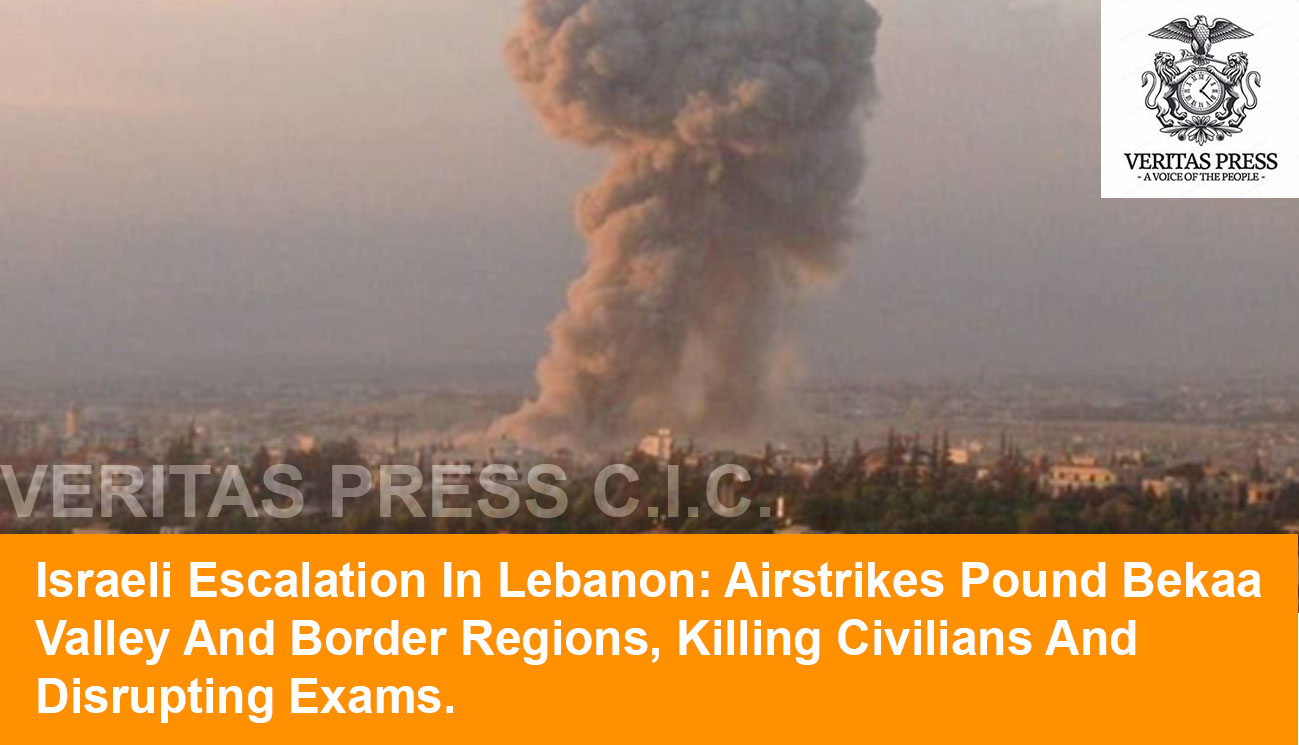Beirut, — Israeli occupation forces have sharply escalated their military campaign in Lebanon with a fresh wave of airstrikes targeting the eastern Bekaa Valley and southern border towns, in yet another violation of the ceasefire agreement reached in late 2024. The attacks have killed civilians, sown terror among residents, and even disrupted Lebanon’s nationwide school examinations, deepening fears of a renewed full-scale war.
Airstrikes Hit Khreibeh And Surrounding Areas:
In the early hours of Tuesday, Israeli warplanes launched multiple air raids on the Khreibeh area in the Bekaa Valley. The Israeli military claimed it had targeted Hezbollah’s so-called “Radwan Force” infrastructure, alleging that the group was using the region to enhance its “offensive capabilities” against Israel. According to Israeli Defence Minister Yisrael Katz, the strikes were a preemptive measure to prevent Hezbollah from reinforcing its positions, although no independently verifiable evidence has been provided.
Footage broadcast by Lebanese outlet Al-Manar and corroborated by local journalists shows extensive destruction in Khreibeh, with several homes reduced to rubble. Rescue teams reported at least three civilians injured, including a woman and her teenage son, and significant material damage to residential areas.
Students Terrified During National Exams:
In a particularly alarming development, Israeli missiles struck near Shmistar Secondary School on Monday, coinciding with the final day of Lebanon’s official Brevet and Baccalaureate examinations. According to Al-Akhbar, three missiles landed in close proximity to the school compound, terrifying hundreds of students and forcing exam supervisors to temporarily halt proceedings.
“We were writing our final paper when the whole building shook. Some students screamed and ran for the exits,” said Mariam H., a 16-year-old student from Baalbek. “How are we supposed to concentrate on our future under these conditions?”
Educational officials have condemned the strikes as a violation of international humanitarian law. “Targeting civilian areas, especially during national academic events, constitutes a war crime,” said a statement from the Lebanese Teachers’ Union.
Wider Bekaa And Border Regions Also Targeted:
Israeli jets also bombed areas near Wadi Em Ali, close to Beit Mshik, with low-flying aircraft shattering windows and causing widespread panic in nearby villages. Eyewitnesses reported sonic booms and smoke plumes visible for miles.
Meanwhile, in southern Lebanon, Israeli occupation forces opened fire from their radar base overlooking Shebaa town late Monday and again on Tuesday morning. Heavy artillery fire targeted agricultural areas and residential outskirts, adding to the already tense atmosphere along the Blue Line.
These attacks form part of what appears to be a deliberate pattern of Israeli escalation since June, despite the nominal ceasefire in place since November 27, 2024.
A Ceasefire In Name Only:
Since the ceasefire took effect, Israeli forces have carried out nearly 3,000 documented violations, according to a new report from the Lebanese Army’s Directorate of Orientation. These include aerial incursions, artillery shelling, and targeted assassinations. At least 223 people have been killed, mostly civilians, and over 500 injured, including dozens of women and children.
The latest strikes bring the number of killed in the Bekaa region this month alone to 19, according to the Lebanese Red Cross. Emergency services have struggled to reach bombed-out areas due to ongoing overflights and the threat of renewed airstrikes.
Moreover, Israel continues to occupy five strategic hills seized during its September 2024 ground invasion: Wazzani Hill, Kfarshouba Heights, Ruwaisat al-Alam, al-Marsad, and Tell al-Nahas, despite limited troop withdrawals from southern Lebanon in early 2025. Lebanese officials, including caretaker Prime Minister Najib Mikati, have condemned the continued occupation as a “blatant breach of the ceasefire and Lebanese sovereignty.”
Hezbollah Responds, Risk Of Wider War Looms:
While Hezbollah has not formally responded to the latest Bekaa attacks, local media affiliated with the group reported drone and missile operations targeting Israeli positions in the Golan Heights and near Metula. These tit-for-tat strikes risk spiraling into a wider conflict reminiscent of the 2006 war, with regional actors warning of the potential for escalation.
UNIFIL (United Nations Interim Force in Lebanon) has issued repeated statements urging restraint, but to little effect. “We are deeply concerned by the deteriorating security situation in eastern and southern Lebanon. All parties must respect the ceasefire and international law,” said UNIFIL spokesperson Andrea Tenenti on Tuesday.
Yet on the ground, Lebanese civilians feel abandoned. “They say there’s a ceasefire, but bombs keep falling, and our children are dying,” said Fatima N., a resident of Baalbek whose home was damaged by shrapnel.
Mounting Civilian Toll and International Silence
Since Israel’s October 8, 2023, assault on Lebanon, initially launched in parallel with its war on Gaza, the conflict has escalated dramatically. By the time war broke out fully on September 23, 2024, more than 4,000 Lebanese civilians had been killed and 17,000 injured, according to data compiled by the Lebanese Ministry of Public Health, the International Committee of the Red Cross, and Human Rights Watch.
To date, there has been no international investigation into Israeli attacks on schools, hospitals, or homes in Lebanon. Human rights groups have called for a formal UN inquiry into Israel’s conduct, citing clear evidence of disproportionate force and potential war crimes.
Conclusion
As Israeli airstrikes continue to expand beyond traditional conflict zones, targeting civilian infrastructure deep inside Lebanon, the prospect of a sustainable peace appears increasingly distant. The repeated targeting of the Bekaa Valley, long considered a humanitarian and educational hub, signals a disturbing shift toward total war. With students now ducking for cover between exam questions, Lebanon’s next generation is being forced to confront not only academic challenges but the grim reality of war without end.




























